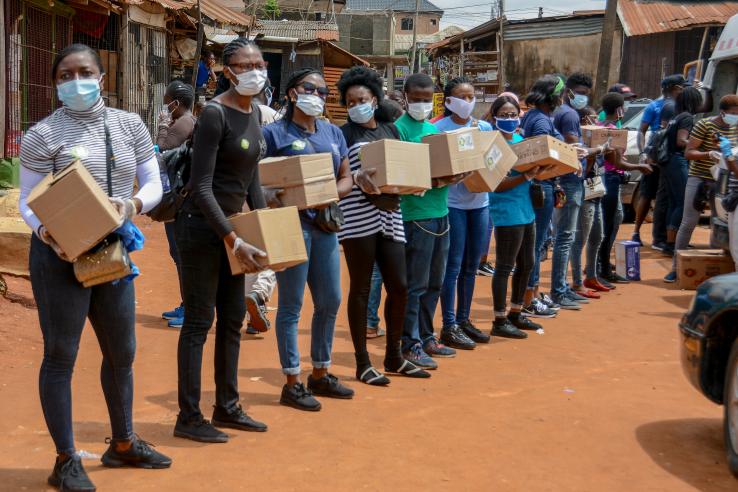News, ideas, and analysis from J-PAL staff and affiliated professors. Subscribe to our newsletter to receive monthly email updates.
Error message
- User warning: Trying to overwrite a cache redirect for "entity_view:block:mainnavigation:[languages:language_interface]=ar:[route.menu_active_trails:main]=menu_trail.main|menu_link_content:719eb78b-3d84-46ed-9028-4ccf333917ab|menu_link_content:47b6178b-ecaf-43f5-88bd-3aab6a7ff364|:[theme]=jpal:[user.permissions]=c16a756118b4c6c4b0dfdc4c8da75aa8bf5904f46b83aea1bfccbaab9625754c" with one that has nothing in common, old one at address "languages:language_interface, route.menu_active_trails:main, theme, user.permissions" was pointing to "languages:language_url", new one points to "url.query_args:lang". in Drupal\Core\Cache\VariationCache->set() (line 144 of core/lib/Drupal/Core/Cache/VariationCache.php).
- User warning: Trying to overwrite a cache redirect for "entity_view:block:jpal_cheeseburgermenu:[languages:language_interface]=ar:[route.menu_active_trails:main]=menu_trail.main|menu_link_content:719eb78b-3d84-46ed-9028-4ccf333917ab|menu_link_content:47b6178b-ecaf-43f5-88bd-3aab6a7ff364|:[route.menu_active_trails:quick-links]=menu_trail.quick-links|:[route.menu_active_trails:utility-menu]=menu_trail.utility-menu|menu_link_content:11c7f363-d36d-41bd-853a-cf3123031050|:[theme]=jpal:[user.permissions]=c16a756118b4c6c4b0dfdc4c8da75aa8bf5904f46b83aea1bfccbaab9625754c" with one that has nothing in common, old one at address "languages:language_interface, route.menu_active_trails:main, route.menu_active_trails:quick-links, route.menu_active_trails:utility-menu, theme, user.permissions" was pointing to "languages:language_url", new one points to "url.query_args:lang". in Drupal\Core\Cache\VariationCache->set() (line 144 of core/lib/Drupal/Core/Cache/VariationCache.php).
- User warning: Trying to overwrite a cache redirect for "entity_view:block:utilitymenu:[languages:language_interface]=ar:[route.menu_active_trails:utility-menu]=menu_trail.utility-menu|menu_link_content:11c7f363-d36d-41bd-853a-cf3123031050|:[theme]=jpal:[user.permissions]=c16a756118b4c6c4b0dfdc4c8da75aa8bf5904f46b83aea1bfccbaab9625754c" with one that has nothing in common, old one at address "languages:language_interface, route.menu_active_trails:utility-menu, theme, user.permissions" was pointing to "languages:language_url", new one points to "url.query_args:lang". in Drupal\Core\Cache\VariationCache->set() (line 144 of core/lib/Drupal/Core/Cache/VariationCache.php).
- User warning: Trying to overwrite a cache redirect for "entity_view:menu_link_content:34:default:en:[languages:language_content]=ar:[languages:language_interface]=ar:[route.name.is_layout_builder_ui]=is_layout_builder_ui.1:[theme]=jpal:[user.permissions]=c16a756118b4c6c4b0dfdc4c8da75aa8bf5904f46b83aea1bfccbaab9625754c" with one that has nothing in common, old one at address "languages:language_content, route.name.is_layout_builder_ui, languages:language_interface, theme, user.permissions" was pointing to "languages:language_url", new one points to "url.query_args:lang". in Drupal\Core\Cache\VariationCache->set() (line 144 of core/lib/Drupal/Core/Cache/VariationCache.php).
- User warning: Trying to overwrite a cache redirect for "entity_view:menu_link_content:35:default:en:[languages:language_content]=ar:[languages:language_interface]=ar:[route.name.is_layout_builder_ui]=is_layout_builder_ui.1:[theme]=jpal:[user.permissions]=c16a756118b4c6c4b0dfdc4c8da75aa8bf5904f46b83aea1bfccbaab9625754c" with one that has nothing in common, old one at address "languages:language_content, route.name.is_layout_builder_ui, languages:language_interface, theme, user.permissions" was pointing to "languages:language_url", new one points to "url.query_args:lang". in Drupal\Core\Cache\VariationCache->set() (line 144 of core/lib/Drupal/Core/Cache/VariationCache.php).
- User warning: Trying to overwrite a cache redirect for "entity_view:menu_link_content:36:default:en:[languages:language_content]=ar:[languages:language_interface]=ar:[route.name.is_layout_builder_ui]=is_layout_builder_ui.1:[theme]=jpal:[user.permissions]=c16a756118b4c6c4b0dfdc4c8da75aa8bf5904f46b83aea1bfccbaab9625754c" with one that has nothing in common, old one at address "languages:language_content, route.name.is_layout_builder_ui, languages:language_interface, theme, user.permissions" was pointing to "languages:language_url", new one points to "url.query_args:lang". in Drupal\Core\Cache\VariationCache->set() (line 144 of core/lib/Drupal/Core/Cache/VariationCache.php).
- User warning: Trying to overwrite a cache redirect for "entity_view:menu_link_content:147:default:[languages:language_interface]=ar:[route.name.is_layout_builder_ui]=is_layout_builder_ui.1:[theme]=jpal:[user.permissions]=c16a756118b4c6c4b0dfdc4c8da75aa8bf5904f46b83aea1bfccbaab9625754c" with one that has nothing in common, old one at address "route.name.is_layout_builder_ui, languages:language_interface, theme, user.permissions" was pointing to "languages:language_url", new one points to "url.query_args:lang". in Drupal\Core\Cache\VariationCache->set() (line 144 of core/lib/Drupal/Core/Cache/VariationCache.php).
- User warning: Trying to overwrite a cache redirect for "entity_view:menu_link_content:37:default:en:[languages:language_content]=ar:[languages:language_interface]=ar:[route.name.is_layout_builder_ui]=is_layout_builder_ui.1:[theme]=jpal:[user.permissions]=c16a756118b4c6c4b0dfdc4c8da75aa8bf5904f46b83aea1bfccbaab9625754c" with one that has nothing in common, old one at address "languages:language_content, route.name.is_layout_builder_ui, languages:language_interface, theme, user.permissions" was pointing to "languages:language_url", new one points to "url.query_args:lang". in Drupal\Core\Cache\VariationCache->set() (line 144 of core/lib/Drupal/Core/Cache/VariationCache.php).
- User warning: Trying to overwrite a cache redirect for "entity_view:menu_link_content:88:default:en:[languages:language_content]=ar:[languages:language_interface]=ar:[route.name.is_layout_builder_ui]=is_layout_builder_ui.1:[theme]=jpal:[user.permissions]=c16a756118b4c6c4b0dfdc4c8da75aa8bf5904f46b83aea1bfccbaab9625754c" with one that has nothing in common, old one at address "languages:language_content, route.name.is_layout_builder_ui, languages:language_interface, theme, user.permissions" was pointing to "languages:language_url", new one points to "url.query_args:lang". in Drupal\Core\Cache\VariationCache->set() (line 144 of core/lib/Drupal/Core/Cache/VariationCache.php).
- User warning: Trying to overwrite a cache redirect for "entity_view:menu_link_content:105:default:[languages:language_interface]=ar:[route.name.is_layout_builder_ui]=is_layout_builder_ui.1:[theme]=jpal:[user.permissions]=c16a756118b4c6c4b0dfdc4c8da75aa8bf5904f46b83aea1bfccbaab9625754c" with one that has nothing in common, old one at address "route.name.is_layout_builder_ui, languages:language_interface, theme, user.permissions" was pointing to "languages:language_url", new one points to "url.query_args:lang". in Drupal\Core\Cache\VariationCache->set() (line 144 of core/lib/Drupal/Core/Cache/VariationCache.php).
- User warning: Trying to overwrite a cache redirect for "entity_view:menu_link_content:132:default:[languages:language_interface]=ar:[route.name.is_layout_builder_ui]=is_layout_builder_ui.1:[theme]=jpal:[user.permissions]=c16a756118b4c6c4b0dfdc4c8da75aa8bf5904f46b83aea1bfccbaab9625754c" with one that has nothing in common, old one at address "route.name.is_layout_builder_ui, languages:language_interface, theme, user.permissions" was pointing to "languages:language_url", new one points to "url.query_args:lang". in Drupal\Core\Cache\VariationCache->set() (line 144 of core/lib/Drupal/Core/Cache/VariationCache.php).
- User warning: Trying to overwrite a cache redirect for "entity_view:menu_link_content:128:default:en:[languages:language_content]=ar:[languages:language_interface]=ar:[route.name.is_layout_builder_ui]=is_layout_builder_ui.1:[theme]=jpal:[user.permissions]=c16a756118b4c6c4b0dfdc4c8da75aa8bf5904f46b83aea1bfccbaab9625754c" with one that has nothing in common, old one at address "languages:language_content, route.name.is_layout_builder_ui, languages:language_interface, theme, user.permissions" was pointing to "languages:language_url", new one points to "url.query_args:lang". in Drupal\Core\Cache\VariationCache->set() (line 144 of core/lib/Drupal/Core/Cache/VariationCache.php).
- User warning: Trying to overwrite a cache redirect for "entity_view:menu_link_content:40:default:en:[languages:language_content]=ar:[languages:language_interface]=ar:[route.name.is_layout_builder_ui]=is_layout_builder_ui.1:[theme]=jpal:[user.permissions]=c16a756118b4c6c4b0dfdc4c8da75aa8bf5904f46b83aea1bfccbaab9625754c" with one that has nothing in common, old one at address "languages:language_content, route.name.is_layout_builder_ui, languages:language_interface, theme, user.permissions" was pointing to "languages:language_url", new one points to "url.query_args:lang". in Drupal\Core\Cache\VariationCache->set() (line 144 of core/lib/Drupal/Core/Cache/VariationCache.php).
- User warning: Trying to overwrite a cache redirect for "entity_view:menu_link_content:41:default:en:[languages:language_content]=ar:[languages:language_interface]=ar:[route.name.is_layout_builder_ui]=is_layout_builder_ui.1:[theme]=jpal:[user.permissions]=c16a756118b4c6c4b0dfdc4c8da75aa8bf5904f46b83aea1bfccbaab9625754c" with one that has nothing in common, old one at address "languages:language_content, route.name.is_layout_builder_ui, languages:language_interface, theme, user.permissions" was pointing to "languages:language_url", new one points to "url.query_args:lang". in Drupal\Core\Cache\VariationCache->set() (line 144 of core/lib/Drupal/Core/Cache/VariationCache.php).
- User warning: Trying to overwrite a cache redirect for "entity_view:menu_link_content:42:default:en:[languages:language_content]=ar:[languages:language_interface]=ar:[route.name.is_layout_builder_ui]=is_layout_builder_ui.1:[theme]=jpal:[user.permissions]=c16a756118b4c6c4b0dfdc4c8da75aa8bf5904f46b83aea1bfccbaab9625754c" with one that has nothing in common, old one at address "languages:language_content, route.name.is_layout_builder_ui, languages:language_interface, theme, user.permissions" was pointing to "languages:language_url", new one points to "url.query_args:lang". in Drupal\Core\Cache\VariationCache->set() (line 144 of core/lib/Drupal/Core/Cache/VariationCache.php).
- User warning: Trying to overwrite a cache redirect for "entity_view:menu_link_content:120:default:[languages:language_interface]=ar:[route.name.is_layout_builder_ui]=is_layout_builder_ui.1:[theme]=jpal:[user.permissions]=c16a756118b4c6c4b0dfdc4c8da75aa8bf5904f46b83aea1bfccbaab9625754c" with one that has nothing in common, old one at address "route.name.is_layout_builder_ui, languages:language_interface, theme, user.permissions" was pointing to "languages:language_url", new one points to "url.query_args:lang". in Drupal\Core\Cache\VariationCache->set() (line 144 of core/lib/Drupal/Core/Cache/VariationCache.php).
- User warning: Trying to overwrite a cache redirect for "entity_view:menu_link_content:43:default:en:[languages:language_content]=ar:[languages:language_interface]=ar:[route.name.is_layout_builder_ui]=is_layout_builder_ui.1:[theme]=jpal:[user.permissions]=c16a756118b4c6c4b0dfdc4c8da75aa8bf5904f46b83aea1bfccbaab9625754c" with one that has nothing in common, old one at address "languages:language_content, route.name.is_layout_builder_ui, languages:language_interface, theme, user.permissions" was pointing to "languages:language_url", new one points to "url.query_args:lang". in Drupal\Core\Cache\VariationCache->set() (line 144 of core/lib/Drupal/Core/Cache/VariationCache.php).
- User warning: Trying to overwrite a cache redirect for "entity_view:menu_link_content:63:default:en:[languages:language_content]=ar:[languages:language_interface]=ar:[route.name.is_layout_builder_ui]=is_layout_builder_ui.1:[theme]=jpal:[user.permissions]=c16a756118b4c6c4b0dfdc4c8da75aa8bf5904f46b83aea1bfccbaab9625754c" with one that has nothing in common, old one at address "languages:language_content, route.name.is_layout_builder_ui, languages:language_interface, theme, user.permissions" was pointing to "languages:language_url", new one points to "url.query_args:lang". in Drupal\Core\Cache\VariationCache->set() (line 144 of core/lib/Drupal/Core/Cache/VariationCache.php).
- User warning: Trying to overwrite a cache redirect for "entity_view:menu_link_content:44:default:en:[languages:language_content]=ar:[languages:language_interface]=ar:[route.name.is_layout_builder_ui]=is_layout_builder_ui.1:[theme]=jpal:[user.permissions]=c16a756118b4c6c4b0dfdc4c8da75aa8bf5904f46b83aea1bfccbaab9625754c" with one that has nothing in common, old one at address "languages:language_content, route.name.is_layout_builder_ui, languages:language_interface, theme, user.permissions" was pointing to "languages:language_url", new one points to "url.query_args:lang". in Drupal\Core\Cache\VariationCache->set() (line 144 of core/lib/Drupal/Core/Cache/VariationCache.php).
- User warning: Trying to overwrite a cache redirect for "entity_view:menu_link_content:45:default:en:[languages:language_content]=ar:[languages:language_interface]=ar:[route.name.is_layout_builder_ui]=is_layout_builder_ui.1:[theme]=jpal:[user.permissions]=c16a756118b4c6c4b0dfdc4c8da75aa8bf5904f46b83aea1bfccbaab9625754c" with one that has nothing in common, old one at address "languages:language_content, route.name.is_layout_builder_ui, languages:language_interface, theme, user.permissions" was pointing to "languages:language_url", new one points to "url.query_args:lang". in Drupal\Core\Cache\VariationCache->set() (line 144 of core/lib/Drupal/Core/Cache/VariationCache.php).
- User warning: Trying to overwrite a cache redirect for "entity_view:menu_link_content:46:default:en:[languages:language_content]=ar:[languages:language_interface]=ar:[route.name.is_layout_builder_ui]=is_layout_builder_ui.1:[theme]=jpal:[user.permissions]=c16a756118b4c6c4b0dfdc4c8da75aa8bf5904f46b83aea1bfccbaab9625754c" with one that has nothing in common, old one at address "languages:language_content, route.name.is_layout_builder_ui, languages:language_interface, theme, user.permissions" was pointing to "languages:language_url", new one points to "url.query_args:lang". in Drupal\Core\Cache\VariationCache->set() (line 144 of core/lib/Drupal/Core/Cache/VariationCache.php).
- User warning: Trying to overwrite a cache redirect for "entity_view:menu_link_content:47:default:en:[languages:language_content]=ar:[languages:language_interface]=ar:[route.name.is_layout_builder_ui]=is_layout_builder_ui.1:[theme]=jpal:[user.permissions]=c16a756118b4c6c4b0dfdc4c8da75aa8bf5904f46b83aea1bfccbaab9625754c" with one that has nothing in common, old one at address "languages:language_content, route.name.is_layout_builder_ui, languages:language_interface, theme, user.permissions" was pointing to "languages:language_url", new one points to "url.query_args:lang". in Drupal\Core\Cache\VariationCache->set() (line 144 of core/lib/Drupal/Core/Cache/VariationCache.php).
- User warning: Trying to overwrite a cache redirect for "entity_view:menu_link_content:48:default:en:[languages:language_content]=ar:[languages:language_interface]=ar:[route.name.is_layout_builder_ui]=is_layout_builder_ui.1:[theme]=jpal:[user.permissions]=c16a756118b4c6c4b0dfdc4c8da75aa8bf5904f46b83aea1bfccbaab9625754c" with one that has nothing in common, old one at address "languages:language_content, route.name.is_layout_builder_ui, languages:language_interface, theme, user.permissions" was pointing to "languages:language_url", new one points to "url.query_args:lang". in Drupal\Core\Cache\VariationCache->set() (line 144 of core/lib/Drupal/Core/Cache/VariationCache.php).
- User warning: Trying to overwrite a cache redirect for "entity_view:menu_link_content:49:default:en:[languages:language_content]=ar:[languages:language_interface]=ar:[route.name.is_layout_builder_ui]=is_layout_builder_ui.1:[theme]=jpal:[user.permissions]=c16a756118b4c6c4b0dfdc4c8da75aa8bf5904f46b83aea1bfccbaab9625754c" with one that has nothing in common, old one at address "languages:language_content, route.name.is_layout_builder_ui, languages:language_interface, theme, user.permissions" was pointing to "languages:language_url", new one points to "url.query_args:lang". in Drupal\Core\Cache\VariationCache->set() (line 144 of core/lib/Drupal/Core/Cache/VariationCache.php).
- User warning: Trying to overwrite a cache redirect for "entity_view:menu_link_content:50:default:en:[languages:language_content]=ar:[languages:language_interface]=ar:[route.name.is_layout_builder_ui]=is_layout_builder_ui.1:[theme]=jpal:[user.permissions]=c16a756118b4c6c4b0dfdc4c8da75aa8bf5904f46b83aea1bfccbaab9625754c" with one that has nothing in common, old one at address "languages:language_content, route.name.is_layout_builder_ui, languages:language_interface, theme, user.permissions" was pointing to "languages:language_url", new one points to "url.query_args:lang". in Drupal\Core\Cache\VariationCache->set() (line 144 of core/lib/Drupal/Core/Cache/VariationCache.php).
- User warning: Trying to overwrite a cache redirect for "entity_view:menu_link_content:51:default:en:[languages:language_content]=ar:[languages:language_interface]=ar:[route.name.is_layout_builder_ui]=is_layout_builder_ui.1:[theme]=jpal:[user.permissions]=c16a756118b4c6c4b0dfdc4c8da75aa8bf5904f46b83aea1bfccbaab9625754c" with one that has nothing in common, old one at address "languages:language_content, route.name.is_layout_builder_ui, languages:language_interface, theme, user.permissions" was pointing to "languages:language_url", new one points to "url.query_args:lang". in Drupal\Core\Cache\VariationCache->set() (line 144 of core/lib/Drupal/Core/Cache/VariationCache.php).
- User warning: Trying to overwrite a cache redirect for "entity_view:menu_link_content:52:default:en:[languages:language_content]=ar:[languages:language_interface]=ar:[route.name.is_layout_builder_ui]=is_layout_builder_ui.1:[theme]=jpal:[user.permissions]=c16a756118b4c6c4b0dfdc4c8da75aa8bf5904f46b83aea1bfccbaab9625754c" with one that has nothing in common, old one at address "languages:language_content, route.name.is_layout_builder_ui, languages:language_interface, theme, user.permissions" was pointing to "languages:language_url", new one points to "url.query_args:lang". in Drupal\Core\Cache\VariationCache->set() (line 144 of core/lib/Drupal/Core/Cache/VariationCache.php).
- User warning: Trying to overwrite a cache redirect for "entity_view:menu_link_content:54:default:en:[languages:language_content]=ar:[languages:language_interface]=ar:[route.name.is_layout_builder_ui]=is_layout_builder_ui.1:[theme]=jpal:[user.permissions]=c16a756118b4c6c4b0dfdc4c8da75aa8bf5904f46b83aea1bfccbaab9625754c" with one that has nothing in common, old one at address "languages:language_content, route.name.is_layout_builder_ui, languages:language_interface, theme, user.permissions" was pointing to "languages:language_url", new one points to "url.query_args:lang". in Drupal\Core\Cache\VariationCache->set() (line 144 of core/lib/Drupal/Core/Cache/VariationCache.php).
- User warning: Trying to overwrite a cache redirect for "entity_view:menu_link_content:55:default:en:[languages:language_content]=ar:[languages:language_interface]=ar:[route.name.is_layout_builder_ui]=is_layout_builder_ui.1:[theme]=jpal:[user.permissions]=c16a756118b4c6c4b0dfdc4c8da75aa8bf5904f46b83aea1bfccbaab9625754c" with one that has nothing in common, old one at address "languages:language_content, route.name.is_layout_builder_ui, languages:language_interface, theme, user.permissions" was pointing to "languages:language_url", new one points to "url.query_args:lang". in Drupal\Core\Cache\VariationCache->set() (line 144 of core/lib/Drupal/Core/Cache/VariationCache.php).
- User warning: Trying to overwrite a cache redirect for "entity_view:menu_link_content:56:default:en:[languages:language_content]=ar:[languages:language_interface]=ar:[route.name.is_layout_builder_ui]=is_layout_builder_ui.1:[theme]=jpal:[user.permissions]=c16a756118b4c6c4b0dfdc4c8da75aa8bf5904f46b83aea1bfccbaab9625754c" with one that has nothing in common, old one at address "languages:language_content, route.name.is_layout_builder_ui, languages:language_interface, theme, user.permissions" was pointing to "languages:language_url", new one points to "url.query_args:lang". in Drupal\Core\Cache\VariationCache->set() (line 144 of core/lib/Drupal/Core/Cache/VariationCache.php).
- User warning: Trying to overwrite a cache redirect for "entity_view:menu_link_content:57:default:en:[languages:language_content]=ar:[languages:language_interface]=ar:[route.name.is_layout_builder_ui]=is_layout_builder_ui.1:[theme]=jpal:[user.permissions]=c16a756118b4c6c4b0dfdc4c8da75aa8bf5904f46b83aea1bfccbaab9625754c" with one that has nothing in common, old one at address "languages:language_content, route.name.is_layout_builder_ui, languages:language_interface, theme, user.permissions" was pointing to "languages:language_url", new one points to "url.query_args:lang". in Drupal\Core\Cache\VariationCache->set() (line 144 of core/lib/Drupal/Core/Cache/VariationCache.php).
- User warning: Trying to overwrite a cache redirect for "entity_view:menu_link_content:58:default:en:[languages:language_content]=ar:[languages:language_interface]=ar:[route.name.is_layout_builder_ui]=is_layout_builder_ui.1:[theme]=jpal:[user.permissions]=c16a756118b4c6c4b0dfdc4c8da75aa8bf5904f46b83aea1bfccbaab9625754c" with one that has nothing in common, old one at address "languages:language_content, route.name.is_layout_builder_ui, languages:language_interface, theme, user.permissions" was pointing to "languages:language_url", new one points to "url.query_args:lang". in Drupal\Core\Cache\VariationCache->set() (line 144 of core/lib/Drupal/Core/Cache/VariationCache.php).
- User warning: Trying to overwrite a cache redirect for "entity_view:menu_link_content:59:default:en:[languages:language_content]=ar:[languages:language_interface]=ar:[route.name.is_layout_builder_ui]=is_layout_builder_ui.1:[theme]=jpal:[user.permissions]=c16a756118b4c6c4b0dfdc4c8da75aa8bf5904f46b83aea1bfccbaab9625754c" with one that has nothing in common, old one at address "languages:language_content, route.name.is_layout_builder_ui, languages:language_interface, theme, user.permissions" was pointing to "languages:language_url", new one points to "url.query_args:lang". in Drupal\Core\Cache\VariationCache->set() (line 144 of core/lib/Drupal/Core/Cache/VariationCache.php).
- User warning: Trying to overwrite a cache redirect for "entity_view:menu_link_content:60:default:en:[languages:language_content]=ar:[languages:language_interface]=ar:[route.name.is_layout_builder_ui]=is_layout_builder_ui.1:[theme]=jpal:[user.permissions]=c16a756118b4c6c4b0dfdc4c8da75aa8bf5904f46b83aea1bfccbaab9625754c" with one that has nothing in common, old one at address "languages:language_content, route.name.is_layout_builder_ui, languages:language_interface, theme, user.permissions" was pointing to "languages:language_url", new one points to "url.query_args:lang". in Drupal\Core\Cache\VariationCache->set() (line 144 of core/lib/Drupal/Core/Cache/VariationCache.php).
- User warning: Trying to overwrite a cache redirect for "entity_view:menu_link_content:61:default:en:[languages:language_content]=ar:[languages:language_interface]=ar:[route.name.is_layout_builder_ui]=is_layout_builder_ui.1:[theme]=jpal:[user.permissions]=c16a756118b4c6c4b0dfdc4c8da75aa8bf5904f46b83aea1bfccbaab9625754c" with one that has nothing in common, old one at address "languages:language_content, route.name.is_layout_builder_ui, languages:language_interface, theme, user.permissions" was pointing to "languages:language_url", new one points to "url.query_args:lang". in Drupal\Core\Cache\VariationCache->set() (line 144 of core/lib/Drupal/Core/Cache/VariationCache.php).
- User warning: Trying to overwrite a cache redirect for "entity_view:menu_link_content:62:default:en:[languages:language_content]=ar:[languages:language_interface]=ar:[route.name.is_layout_builder_ui]=is_layout_builder_ui.1:[theme]=jpal:[user.permissions]=c16a756118b4c6c4b0dfdc4c8da75aa8bf5904f46b83aea1bfccbaab9625754c" with one that has nothing in common, old one at address "languages:language_content, route.name.is_layout_builder_ui, languages:language_interface, theme, user.permissions" was pointing to "languages:language_url", new one points to "url.query_args:lang". in Drupal\Core\Cache\VariationCache->set() (line 144 of core/lib/Drupal/Core/Cache/VariationCache.php).
- User warning: Trying to overwrite a cache redirect for "entity_view:block:footerlogoblock:[languages:language_interface]=ar:[theme]=jpal:[user.permissions]=c16a756118b4c6c4b0dfdc4c8da75aa8bf5904f46b83aea1bfccbaab9625754c" with one that has nothing in common, old one at address "languages:language_interface, theme, user.permissions" was pointing to "languages:language_url", new one points to "url.query_args:lang". in Drupal\Core\Cache\VariationCache->set() (line 144 of core/lib/Drupal/Core/Cache/VariationCache.php).






